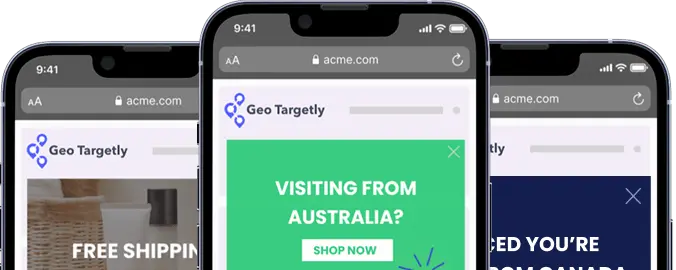

Key takeaways:
- An IP address can reveal general details like location (city-level) and internet provider, but not someone's exact address or identity.
- It’s usually legal to find an IP address, as long as it’s done ethically and for legitimate reasons (like security or business).
- There are several safe ways to find an IP, including using email headers, IP logging tools, or server logs.
- You can hide your own IP using tools like VPNs, proxies, or the Tor network to stay private online.
Finding someone’s IP address isn’t just for hackers or IT pros. Whether you’re dealing with spam, investigating suspicious activity, or customizing your website’s content, IP addresses can reveal useful, legitimate insights.
This guide breaks down the most reliable methods for finding someone’s IP address. We’ll also cover what an IP address can and can’t tell you, legal considerations, and how marketers use IPs to personalize experiences.
Let’s get right into it.
What is an IP address and what can it reveal?
An IP address is a unique number every device gets when it connects to the internet. It helps route information from one place to another, like an address label on a package. There are two main types of an IP address: IPv4 and IPv6. IPv4 is the older format and still widely used, but it's running out of addresses. IPv6 is the newer, more complex version, built to handle billions more devices.
Every device also has either a public or private IP. A public IP address is what the internet sees, it’s assigned by your internet provider. A private IP address stays inside local networks like your home Wi-Fi. It’s used to help your devices talk to each other but can’t be traced directly from outside.
So what can an IP actually tell you? Not as much as people often think, but still enough to be useful. An IP address can reveal:
- The user’s general location, usually at the city or regional level.
- The Internet Service Provider (ISP)
- The type of device or network (in some cases)
You won’t get a name or street address from just an IP, but this data is often enough to spot suspicious activity or serve relevant content.

Is it legal to find someone’s IP address?
Yes, in most cases, finding someone’s IP address is legal. Just looking at an IP address isn’t illegal. Every website you visit sees your public IP automatically. It’s how the internet works.
But the reason you want the IP, and what you do with it matters.
If you're trying to trace an IP for cybersecurity, marketing, or technical troubleshooting, you're generally in safe territory. IT professionals do this every day to detect threats, block attacks, or understand user behavior.
Where it becomes a problem is when someone uses an IP address to harass, stalk, dox, or launch attacks. That’s illegal in many places, including under laws like the U.S. Computer Fraud and Abuse Act (CFAA) and Europe’s GDPR, which treats IPs as personal data in some cases.
So, what's the rule of thumb?
Use the information ethically and for a legitimate reason. If your intent is to protect your network, block spam, or personalize a user experience, you're on solid ground. But if you’re tracking someone out of curiosity or malice, don’t do it.
If you're in doubt, check your local laws or talk to a legal expert. What’s allowed in one country might not be okay in another.
Methods to find someone’s IP address
There are several legitimate ways to find someone’s IP address. The method you use depends on how you're connected to the person. Below are practical, ethical ways to do it, starting with the most technical.
1. Use command line tools (for direct connections)
If you’re connected to someone through a peer-to-peer app, online game, or file-sharing platform, you may be able to see their IP address using built-in tools.
Here’s how:
- Open your terminal (Command Prompt on Windows, Terminal on macOS or Linux).
- Use a command like netstat or netstat -n to view active connections.
- Look for unfamiliar IP addresses listed as foreign addresses—those may be from the other person’s device.
You can also use ping or traceroute to trace the path to a specific domain or IP. These tools don’t expose private data, but they can help reveal IPs tied to certain connections, especially if you're in a live session or direct link.
This method works best in real-time and with apps that connect users directly, like multiplayer games or chat clients.

2. Analyze email headers
If someone sends you an email, you may be able to find their IP address in the message’s header. This works best with older systems or email clients that don’t mask the sender’s IP.
Here’s how to check:
- In Gmail, open the email → click the three dots → choose “Show original.”
- In Outlook, right-click the message → select “View source” or “Message options.”
- In Yahoo Mail, open the message → click “More” → select “View raw message.”
Look for lines like Received: from or X-Originating-IP:. If the IP isn’t hidden by the email service, you’ll see the sender’s public IP address here.
Keep in mind: Major providers like Gmail often mask IPs to protect privacy. So this method doesn’t work in every case—but when it does, it’s fast and accurate.

3. Use IP logging services
If you can get someone to click a link you control, you can capture their IP address using an IP logger. This method is simple and effective, but you must use it responsibly and only with clear, ethical intent.
Here’s how it works:
- Go to a service like Grabify, IP Logger, or similar.
- Enter any valid URL (like a news article or video) into the tool.
- The service gives you a shortened tracking link.
- Send that link to the person—via chat, email, or message.
- When they click it, their IP address is logged. You’ll be able to see their IP, location (city-level), user agent, and a timestamp.
These tools are easy to use and free. But again: never use this method to trick or target people unfairly. Make sure the content you're linking to is safe and relevant, and always follow ethical guidelines.
For marketers and security teams, this is a common way to verify clicks, detect bots, or trace suspicious behavior.
Tip: If you want to learn more about logging, we recommend you read this comprehensive guide to understanding log levels.

4. Check web server or hosting logs
If you own a website, you already have access to your visitors’ IP addresses. Web servers record this data automatically in access logs, and it’s completely legal to use for security, analytics, or personalization.
Here’s where to look:
- If you use cPanel, go to Raw Access Logs or Awstats.
- On a VPS or dedicated server, check Apache or Nginx access logs (/var/log/apache2/access.log or /var/log/nginx/access.log).
- If your site uses Cloudflare, go to Analytics → Traffic to see anonymized IP data.
You’ll be able to see:
- The IP address
- Time and date of the visit
- Which page they viewed
- User agent (browser, OS)
This method is especially useful if you're monitoring for spam, scraping bots, or suspicious traffic patterns. Just make sure you're following your privacy policy and storing the data securely.
5. Use social media or forums strategically
Most social media platforms don’t show users’ IP addresses. But in some cases, you can infer or collect IPs through direct interaction.
For example:
- On certain peer-to-peer chat apps or niche forums, IPs may be exposed in logs.
- If someone joins your private server or hosted session (like a game or a file-sharing app), you may be able to see their IP using the platform’s logs or console.
- Some forums or private communities may log visitor IPs (especially admin/moderator tools).
Important: Don’t try to exploit loopholes or trick people into revealing their IP. And always respect platform rules and privacy policies. If you're an admin or moderator, make sure you disclose IP tracking in your site's terms.
This method works best when you're managing your own space like a private server, Discord channel, or forum, where user connections are logged by design.
What you can (and can’t) do with an IP address
Finding someone’s IP address can tell you a few useful things, but there are also clear limits to what you can learn.
What you can do:
- See approximate location: You can often trace the IP to a city or region. It’s not exact, but it’s good enough to understand where someone’s device is connecting from. Tools like Geo Targetly’s IP Geolocation API can help you map IPs to locations accurately.
- Identify the ISP: IPs show which internet provider the person is using (like Verizon, Comcast, etc.). This can help in tracing abuse or filtering traffic by network.
- Detect the device type or browser: Some tools can show whether a connection came from a mobile device, desktop, or even a specific browser. This is usually seen in the user agent data alongside the IP.
What you can’t do:
- You can’t get someone’s home address
- You can’t see their phone number
- You can’t read their messages or access their device
An IP address is useful, but it’s not a magic key to someone’s identity. It gives you technical clues, not personal details.
Extra tools for digging deeper
If you want to learn more about an IP address, here are two tools that help:
- Reverse DNS lookup: This shows the domain name linked to an IP. It’s often used by sysadmins to check if an IP is part of a company or service.
- WHOIS lookup: This reveals the owner of a block of IP addresses. If it’s a business or hosting provider, you’ll usually see their contact info.
Keep in mind: These tools work best for public servers and business-owned IPs, not for individual users on home Wi-Fi.
When and why you might need to find an IP address
Most people don’t look for an IP address without a good reason. In many cases, it's about solving a problem, improving security, or understanding your audience better. Here are the most common, legitimate reasons you might need to trace an IP:
- Cybersecurity and incident response: If you’re dealing with spam, harassment, phishing, or suspicious activity, tracing the sender’s IP can help you understand where it's coming from. IT teams often track IPs to block malicious traffic, report abuse, or filter unwanted connections at the firewall level.
- Tracking abuse or violations: Forum moderators, server admins, and community managers may use IP addresses to identify repeat offenders, prevent sockpuppet accounts, or report threats to internet service providers.
- Marketing and business insights: Marketers use IP data to understand where users are located and how different regions engage with their content. This helps tailor offers, optimize ad spend, and localize landing pages.
- Website personalization: If you run a website, IP-based geolocation lets you customize what users see based on their region. That could mean showing local pricing, relevant promotions, or even translating content.
Here’s a quick breakdown of different use cases and the methods that fit:
The key is to use IP information responsibly, in a way that improves safety, experience, or relevance for the user, not to invade privacy.
Using IP addresses for personalized marketing
Personalization these days, especially for marketing, is a must. And one of the easiest and most reliable ways to personalize a user’s experience is by using their IP address to understand a little about who they are and where they’re coming from.
When you know a visitor’s general location, you can show content that feels more relevant right away. That means:
- Showing the right currency or shipping info
- Highlighting local promotions or services
- Routing users to the right language or regional site
This kind of targeting can reduce bounce rates, because users are less likely to leave if they see content that makes sense for them from the start. It also boosts conversion rates, because location-specific offers are more likely to match what a visitor actually needs.
And if you run campaigns, IP-based personalization can improve campaign performance by aligning your messaging with the user’s real-world context.
How Geo Targetly helps with geo-personalization
Geo Targetly offers tools designed to personalize content using a visitor’s IP address—ethically and effectively.
Two standout products that highlight this are:
- Geo Content: This tool lets you show or hide parts of your website based on a visitor’s location. You can localize messages, feature regional promotions, or change visuals—all without creating separate pages.
- Geo Redirects: Automatically send users to the right version of your site based on their country, state, or city. It’s perfect for global businesses with region-specific domains or offers.
Use cases include:
- Showing local phone numbers to build trust
- Highlighting geo-specific promotions to boost relevance
- Delivering location-aware messaging to improve UX
Setup is simple. Drop a script on your site, and manage rules with a user-friendly dashboard.
👉 Want to personalize your site with IP data the right way? Try Geo Targetly and start turning more visitors into customers, automatically.
How to hide or mask your own IP (bonus security tips)
Every time you go online, your IP address is visible, and some of those who are looking for IPs aren’t acting in good faith. If you want to protect your privacy or browse more securely, you’ll need to mask it. Here’s how to do that using reliable, proven methods.
Use a VPN
A VPN (Virtual Private Network) hides your IP by routing your connection through a remote server. It also encrypts your data, which protects it from snooping, especially on public Wi-Fi.
Best for:
- Keeping your browsing private
- Accessing region-blocked content
- Hiding your real IP from websites and trackers
Choose a VPN provider with a no-logs policy and strong encryption standards. Some of the most trusted VPNs include NordVPN or ExpressVPN, and ProtonVPN.
Use a proxy server
A proxy server also hides your IP by acting as a middle layer between you and the web. Unlike VPNs, proxies often don’t encrypt your traffic, so they’re less secure, but useful for basic tasks.
Best for:
- Bypassing simple content restrictions
- Managing multiple regional sessions (e.g., testing)
Avoid free proxies—they’re often slow, unreliable, and risky. Trusted proxy providers include Smartproxy, Oxylabs, and Bright Data.
Use the Tor Network
Tor (The Onion Router) routes your traffic through several volunteer-run servers. Each layer of routing adds more privacy.
Best for:
- Browsing anonymously
- Avoiding tracking and censorship
Tor is slower than VPNs but offers stronger anonymity. It’s ideal for users who need full privacy, not just IP masking.
Dynamic vs. static IPs
- A dynamic IP changes periodically. Most home internet plans use this by default. It gives you a small privacy edge—your IP won’t always stay the same.
- A static IP stays fixed. It’s common for business accounts or remote workers who need consistent access. But, it’s easier to track.
If privacy is your goal, stick with dynamic IPs whenever possible.
Best practices for staying anonymous online
- Always use HTTPS websites
- Don’t log into personal accounts while using privacy tools
- Regularly clear cookies and browser data
- Combine tools (VPN + private browser) for stronger protection
- Check what your IP reveals using sites like whatismyipaddress.com
Final thoughts: Use IP knowledge responsibly
Knowing how to find someone’s IP address can be useful—but with that knowledge comes responsibility. IPs can help you block threats, personalize content, or track down suspicious behavior, but they can also be misused if you’re not careful.
Always ask yourself: Why am I using this IP information?
If the goal is to protect, improve, or personalize—great. If it crosses into harassment, tracking, or violating someone’s privacy, stop.
Here’s the bottom line:
- It’s legal to trace an IP in most cases—but intent matters.
- It’s helpful for marketers, IT teams, and website owners.
- It’s not okay or legal to use IP data to stalk, dox, or intimidate anyone.
Stick to ethical methods, use trusted tools, and respect user privacy. When in doubt, focus on creating a safer, more personalized web experience for everyone.
If you’re looking for a reliable way to use IP data for good - like personalizing your website content - Geo Targetly makes it easy, ethical, and effective.
FAQs
Can I find someone’s IP address on Facebook or Instagram?
No, not directly. Platforms like Facebook and Instagram don’t show IP addresses to users for privacy reasons. You’d need a legal request or a direct interaction (like clicking a tracked link) to trace someone that way.
Is finding someone’s IP the same as hacking?
Not at all. Simply seeing or tracing an IP address isn’t hacking. Hacking means unauthorized access to someone’s system or data. IPs are public-facing by design, but what you do with them determines if it's legal or not.
Can someone hide their real IP from me?
Yes. Many people use VPNs, proxies, or tools like Tor to mask their real IP. In those cases, you’ll only see the IP of the service they’re using, not their actual location or provider.
Are there IP tracker apps for phones?
There are IP lookup and tracking apps available, but be cautious. Many just show your own IP or offer basic public lookup tools. For accurate and ethical IP tracking, use trusted services or web-based tools, not shady mobile apps.





.webp)


































